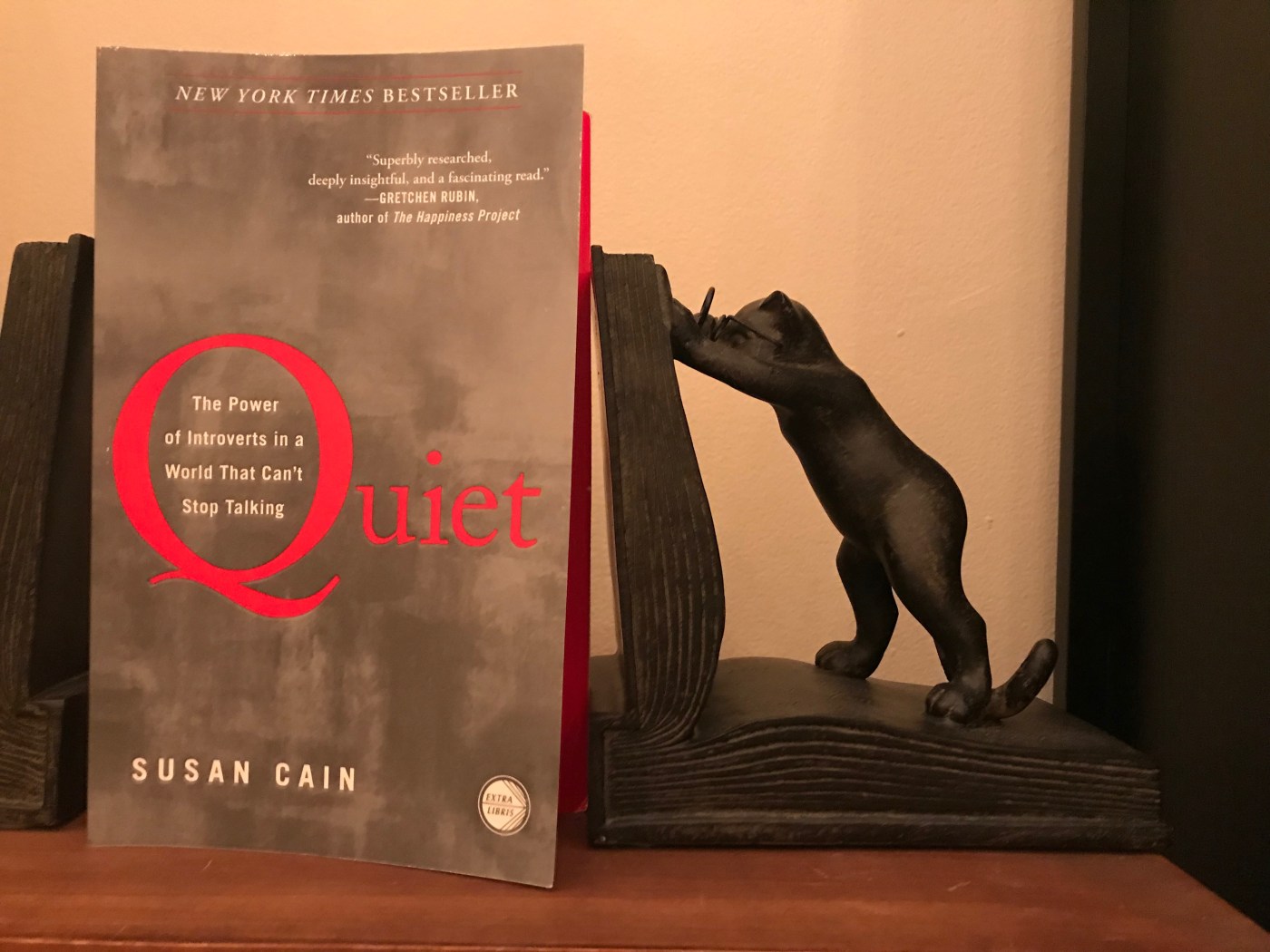“Introverts, in contrast, may have strong social skills and enjoy parties and business meetings, but after a while wish they were home in their pajamas. They prefer to devote their social energies to close friends, colleagues, and family. They listen more than they talk, think before they speak, and often feel as if they express themselves better in writing than in conversation. They tend to dislike conflict. Many have a horror of small talk, but enjoy deep discussions.” – Susan Cain
Quiet by Susan Cain
271 pages
Genre: Nonfiction
Published by Broadway Books, 2012
Rating: 4.5 out of 5 stars
Re-readability: I’ll probably return to this one in a few years.
Reviewed by Indiana
Sometimes a book’s content stays within its pages. I don’t necessarily feel the need to talk about it with others, to draw its secrets out into the open.
But I could not stop talking about this one with people, which sounds funny as I type this, as the other half of the title is “The Power of Introverts in a World That Can’t Stop Talking.”
Susan Cain managed to weave in fascinatingly complex research and put it into perspective with quirky and relatable characters. Quiet came out back in 2012, yet when I searched for a copy at my local bookstore, there was still an entire section dedicated to this book.
After reading it in a matter of a few days, I can see why.
I’ve known I was more introverted for most of my life. At the same time, I’ve felt conflicted about calling myself that that because I genuinely enjoy being around people sometimes and I rarely, if ever, feel awkward about being around others. But after a certain point of being around other people, I tend to hit this wall, almost like it’s a stimulation wall and I feel an intense need to be alone again or at least with just one or two people.
Cain explains that that is exactly what introverts sometimes experience and that it’s okay. In one study that she quotes, developmental psychologist Jerome Kagan studies five-hundred four-month old babies and tests to see how they react to certain stimulants. Some screamed and cried if a balloon was popped near them. Others didn’t really react at all. Those who cried were considered “high-reactive” and those who did not were considered “low-reactive.” The study followed these infants into adulthood (it started in the 1980s) and it turns out that the kids who were high-reactive tended to be introverted while the kids who were low-reactive tended to be extroverted.
Throughout the book, Cain described titans of industry who were/are introverts and discusses why the stock market crash of 2008 happened in part because there were only extroverts making the decisions (i.e. the cautious people were all either let go or were never promoted in the first place).
She also discussed raising introverted children and the best ways to help them navigate classroom settings that unproportionally serves extroverted learners. This section made me nervous, especially when Cain points out how so many extroverted parents think there’s something wrong with their introverted child (some think they’re depressed or have social anxiety). It’s stunning to me that a parent would jump to that conclusion just because their child doesn’t like to play with other kids as much or because they’re quiet. It makes me thankful for my upbringing. I had one teacher in elementary school who told my parents that I had ADD because I daydreamed. This teacher told my mother to put me on medication.
My mom—pissed off and wanting another opinion—visited the school psychologist. He didn’t recommend medication, nor did he diagnose me with ADD. Instead, he looked at my grades and birthdate (I was young for my grade) and said “she’ll be fine. Just give it time.”
And he was right. It wasn’t that I needed help focusing, it was that the classroom was designed for mostly group projects and teamwork over individual learning. It was an environment where a child who would thrive by themselves wouldn’t be able to focus on any one thing because everything was overstimulating.
It makes me wonder if there were other kids in my grade that were told the same thing and whose parents didn’t ask for a second opinion.
But back to the book, Cain also discussed how introverts and extroverts can manage their relationships. This involves a bit of compromise, though I would argue that any relationship requires this. Being in a relationship with an extrovert, we’ve managed to balance this out over the last few years and it was great to have confirmation that that’s exactly what we’re supposed to be doing.
While I was doing research on this book, I came across a few articles about how Cain put introverts on a moral pedestal and how there were problems with the way that she discussed Asian-Americans and introversion. I also felt like at times she put introversion on some sort of moral pedestal, when introversion isn’t about morals at all, it’s about where one gets their energy from (within themselves vs. outside of themselves). But at the same time, she is right in saying that our culture has long over-celebrated extroverted tendencies.
Quiet is an excellent book that empowers introverts and can explain (some of) them to extroverts.

I loved this book so much, when I read it a few years ago 🙂 Glad you liked it!
LikeLiked by 1 person